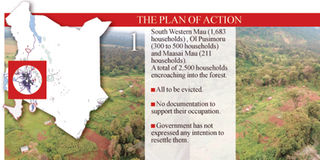Revealed: Details of Mau payout scheme

What you need to know:
- Only 1,900 families are sure to get cash or land, says a new government roadmap
More than 5,000 families will leave the Mau Forest without compensation, according to a new government document.
A paper prepared by the interim secretariat coordinating the rehabilitation of the water tower says that only 1,962 people on forest land are sure to get compensation from the government.
About 2,500 households that have encroached on protected forest areas of the complex stand no chance of being either resettled or compensated.
No documentation
These include 1,683 families living in the South Western Mau, between 300 and 500 households in Ol Pusimoru and 211 households in the Maasai Mau.
“They have no documentation to support their occupation of the land and the government never expressed an intention to set aside those protected forest areas for settlement,” the paper explains.
Their case is slightly different from that of about 2,147 households settled inside what is known as Trust Land Forest “due to illegal extension of group ranches beyond their adjudicated boundaries”.
They too will leave, but their resettlement or compensation will be dealt with on a case by case basis.”
Also to be removed are families on 61,586 hectares excised from the most critical catchment area of the country’s biggest water tower in 2001. But whether they will be compensated or resettled will also be determined on a case by case basis.
It is looking likely that the government will ask the families to leave before resettling or compensating them because it has already set aside funds for the eviction but none for resettlement or compensation.
According to the paper, Sh100 million will be needed to move settlers from the forest.
It will take an additional Sh68.4 million to organise logistics for moving, resettlement and repossession, including the establishment of offices, land survey and valuation, and finalising a resettlement framework policy.
Tree nurseries
It has also set aside about Sh450 million to support families removed from the forest over a three-year period.
The support will involve enabling the families to identify and adopt alternative livelihoods, support for alternative energy conserving practices, support for on-farm tree planting and extension services, including the establishment of institutional and private tree nurseries.
Some Sh530 million has been set aside to cater for the upscaling of the joint force made up of Administration Police (AP), Kenya Forest Service (KFS) and Kenya Wildlife Service (KWS) officers overseeing movement out of the Mau for the next three years.
An additional Sh450 million is set aside for the infrastructure for monitoring and enforcing the protection of the complex, including setting up of offices for the various enforcement units.
The paper says that the budget required for the resettlement and compensation will be determined once the secretariat lays the groundwork for the relocation, resettlement and repossession of illegally acquired forest land.
No funds have been set aside for buying land on which to resettle deserving cases, further fuelling fears that they may have to wait longer to be resettled.
Speaking at a consultative forum between the government and the donor community and private sector representatives at the United Nations Complex at Gigiri, Prime Minister Raila Odinga, however, allayed fears that the government may resort to evicting people from the forest without compensation.
“The other day we were told that in Tanzania, people were told to move out first, halafu tuongee baadaye (we will negotiate later). We will not do that, we are compassionate,” said the PM.
According to the document, 99.3 per cent of the 2001 excisions are irregular.
But the document says the government will offer transport and money for the upkeep of deserving cases. It describes resettlement as a government-supported scheme “where the government provides alternative land for the dispossessed, along with livelihood support. It must be noted that many of the landowners have irregular title deeds. For example, title deeds were issued when the land was still gazetted as forest reserve or in disregard of a High Court order restraining the government from moving ahead with the excision process,” it notes.
Speaking at the consultative forum, Environment minister John Michuki was adamant that only 1,962 people stood a chance of being compensated.
He said the government had identified the 1,962 people way back in 2007 but efforts to compensate them then were scuttled by local politicians.
“I personally had developed a questionnaire on which those living in the Mau were to state where they came from, whether they left any land behind, how they acquired the land in the forest and so on, but local politicians told them not to fill the questionnaire,” said Mr Michuki.
The paper says immediate livelihood support will be required for evicted families.




